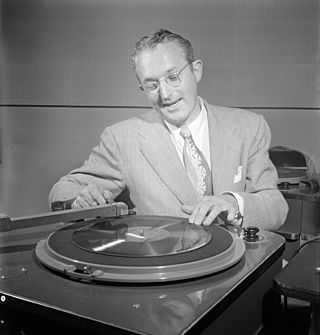
Thomas Francis Dorsey Jr. was an American jazz trombonist, composer, conductor and bandleader of the big band era. He was known as the "Sentimental Gentleman of Swing" because of his smooth-toned trombone playing. His theme song was "I'm Getting Sentimental Over You". His technical skill on the trombone gave him renown among other musicians. He was the younger brother of bandleader Jimmy Dorsey. After Dorsey broke with his brother in the mid-1930s, he led an extremely successful band from the late 1930s into the 1950s. He is best remembered for standards such as "Opus One", "Song of India", "Marie", "On Treasure Island", and his biggest hit single, "I'll Never Smile Again".

"In the Mood" is a popular big band-era jazz standard recorded by American bandleader Glenn Miller. "In the Mood" is based on the composition "Tar Paper Stomp" by Wingy Manone. The first recording under the name "In the Mood" was released by Edgar Hayes & His Orchestra in 1938.

"Chattanooga Choo Choo" is a 1941 song written by Mack Gordon and composed by Harry Warren. It was originally recorded as a big band/swing tune by Glenn Miller and His Orchestra and featured in the 1941 movie Sun Valley Serenade. It was the first song to receive a gold record, presented by RCA Victor in 1942, for sales of 1.2 million copies.

Glenn Miller and His Orchestra were an American swing dance band formed by Glenn Miller in 1938. Arranged around a clarinet and tenor saxophone playing melody, and three other saxophones playing harmony, the band became the most popular and commercially successful dance orchestra of the swing era and one of the greatest singles charting acts of the 20th century. As of 2024, Ray Anthony is the last surviving member of the orchestra.

"It Happened in Sun Valley" is a 1941 song composed by Harry Warren, with lyrics by Mack Gordon. It was recorded and featured by Glenn Miller and his orchestra in the movie Sun Valley Serenade.

Buddy Feyne was an American lyricist during the swing era. He wrote the lyrics for "Tuxedo Junction", which went to No. 1 on the Billboard chart in 1940 when Glenn Miller recorded it, "Jersey Bounce", which was No. 15 on the Cash Box Hit Parade of 1942., and "Jumpin' with Symphony Sid".
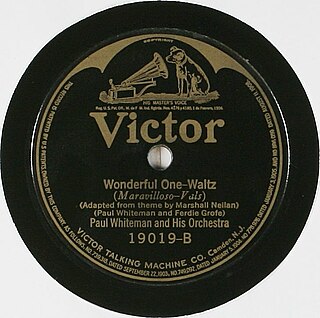
"Wonderful One" is a popular song recorded by the Paul Whiteman Orchestra on January 25, 1923 in New York and was released as Victor 19019-B. The record reached no. 3 on the Billboard chart. The song was also recorded as "My Wonderful One".

"Moonlight Serenade" is an American swing ballad composed by Glenn Miller with subsequent lyrics by Mitchell Parish. It was an immediate phenomenon when released in May 1939 as an instrumental arrangement, though it had been adopted and performed as Miller's signature tune as early as 1938, even before it had been given the name "Moonlight Serenade". In 1991, Miller's recording of "Moonlight Serenade" was inducted into the Grammy Hall of Fame.

"The Woodpecker Song" is originally an Italian song. The music was written by Eldo Di Lazzaro in 1939, while the Italian lyrics were written by Bruno Cherubini. The English lyrics were written by Harold Adamson. The song became a hit in 1940, recorded by Glenn Miller and His Orchestra, The Andrews Sisters, and Kate Smith in 1940.
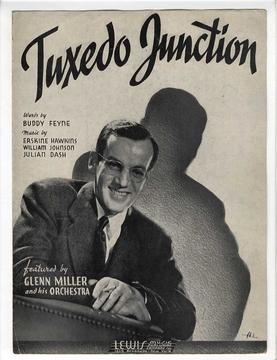
"Tuxedo Junction" is a popular big band song recorded by Glenn Miller and His Orchestra, becoming a No. 1 hit in 1940. The music was written by Erskine Hawkins, Bill Johnson, and Julian Dash and the lyrics by Buddy Feyne. The song was introduced by Erskine Hawkins and His Orchestra, a college dance band previously known as the Bama State Collegians. RCA released it in 1939 and it climbed to #7 on the American pop charts.
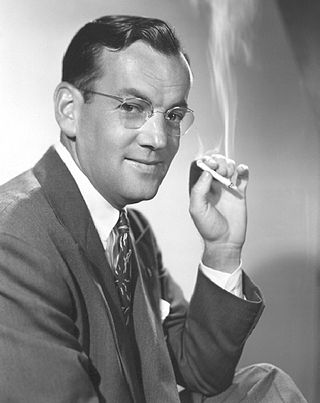
Between 1938 and 1944, Glenn Miller and His Orchestra released 266 singles on the monaural ten-inch shellac 78 rpm format. Their studio output comprised a variety of musical styles inside of the Swing genre, including ballads, band chants, dance instrumentals, novelty tracks, songs adapted from motion pictures, and, as the Second World War approached, patriotic music.
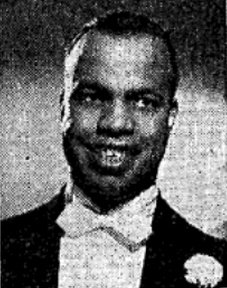
Erskine Butterfield was an American pianist, singer, bandleader and composer, active in the 1930s to the 1950s, and best known for his boogie-woogie and swing piano style. Butterfield was credited with "helping to invent the style of 'cocktail piano'".
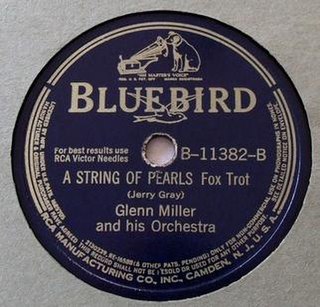
"A String of Pearls" is a 1941 song recorded by Glenn Miller and His Orchestra on RCA Bluebird that November, becoming a #1 hit. It was composed by Jerry Gray with lyrics by Eddie DeLange. The song is a big band and jazz standard.

"It Must Be Jelly ('Cause Jam Don't Shake Like That)" is a 1942 jazz and pop song recorded by Glenn Miller and His Orchestra. The song was released as an RCA 78 single by Glenn Miller in 1944. Woody Herman also released the song as a single and as a V-Disc.

"Pennsylvania 6-5000" is a 1940 swing jazz and pop standard recorded by Glenn Miller and His Orchestra as a Bluebird 78 rpm single. The music was by Jerry Gray and the lyrics by Carl Sigman.

"I Know Why " is a 1941 song by Glenn Miller and His Orchestra. The song appeared in the 20th Century Fox movie Sun Valley Serenade. The song was also released as an RCA Bluebird 78 single.

"Elmer's Tune" is a 1941 big band and jazz standard written by Elmer Albrecht, Dick Jurgens and Sammy Gallop. Glenn Miller and his Orchestra and Dick Jurgens and his Orchestra both charted with recordings of the composition.

"Crosstown" is a 1940 song recorded by Glenn Miller and His Orchestra. The song was written by James Cavanaugh, John Redmond, and Nat Simon.

Glenn Miller Plays Selections From the Film "The Glenn Miller Story" is a 1954 compilation album by Glenn Miller and his Orchestra. The collection contained songs featured in the 1954 Universal-International film The Glenn Miller Story starring James Stewart and June Allyson. It was the first Glenn Miller album to be certified Gold in the U.S.




















